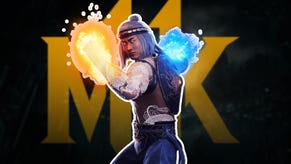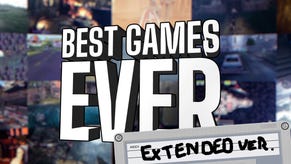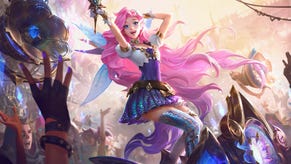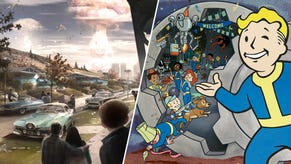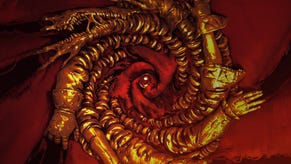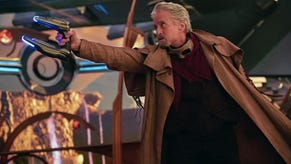Games of the generation: Brenna's trend-tracking life-eaters
What were the games of the current generation? VG247′s staff pick their highlights of the past eight years ahead of the PS4 and Xbox One launch. Today, Brenna lists games that obsessed her while embracing generational trends - both good and bad.
This is the first generation where picking a handful of games as representative is really, really hard. It's been a long break between hardware cycles, something that has been blamed for retail downturn and reduced innovation, but which has certainly helped keep both platform holders and content producers afloat while the world changed around them.
Over the past eight years, games and the business of games really have changed. Our concept of what constitutes a game and a gamer have changed - or should have changed, although since you're reading this on the Internet I have to assume you're likely to need an axe to get new ideas into your head. Expectations have changed. Delivery systems have changed. In some ways, the games that defined us at the start of the generation in 2005 are very different from those that define us now - and in other ways, they're alarmingly similar.
When I look back over the past generation, which kicked off for me with the PS3, before including an Xbox 360 and finally a beast of a PC (loading times drove me over the divide), I can't pick out a handful of games that I would say, hands-down, are better or more representative than all the rest. But I can pick five games and franchises that meant a lot to me, personally, and when I cast my eye over them, I see the generation unfolding and expanding, growing up alongside me.
We've both had a rough few years.
5. Metal Gear Solid 4: Guns of the Patriots
Ridiculously long install times; an online component that would have been much more popular on Xbox Live; downloads that lasted approximately forever; design that showcased the power of new hardware while not actually being that much fun. Metal Gear Solid 4 is museum piece of the PlayStation 3's frankly dire launch years. Can you believe it got perfect review scores? Ho ho, what clarity hindsight brings.
I loved it anyway. After the much-deserved success of Metal Gear Solid 3: Snake Eater, Konami and Sony pulled Hideo Kojima out of his voluntary retirement and let him have his head with the result that his mile-wide streak of insanity shows plainly. I quite like all the nonsense, certainly more than when the series stops being playful and takes itself seriously with a 15 minute cutscene on the history and ethics of extrapolated future technology.
MGS4 was one of a handful of titles I played through to completion while stuck in bed with a serious illness (the others being The Elder Scrolls IV: Oblivion, Bladestorm: The Hundred Years War, GTA IV and Warriors Orochi; yes, I was sick for a long time). It was one of the last games I played through with my partner of the time, before we both got too busy for such indulgences, and followed on from us doing an MGS3 run. It has a special place in my heart for that as well as for bearing what might have been the hallmarks of the end of console wars if Sony hadn't rapidly pulled its socks up and stopped being laughably rubbish.
Now that I'm amicably divorced (oh god you guys I have to do my own laundry and nobody else ever makes tea, it is the worst) I am quite unmoved at the prospect of Metal Gear Solid 5: The Phantom Pain. Not excited about a Metal Gear game - if that's not generational fatigue I don't know what is.
4. The Walking Dead
What I love about The Walking Dead is how much it antagonises the Game Police. I am so wretchedly tired of complaints that such-and-such is "not a GAME" because it doesn't have scores or shooting or puzzles or whatever blasted differentiator Mr Internet has decided is lacking from something he doesn't want to like, in case it causes him to grow an actual brain, after which he'll have to learn to live with late-stage capitalism-induced existential horror just like the rest of us. What the heck does it matter what is and isn't a game? Who died and made you the truthmaker? Get off the Internet. Go outside in the fresh air.
In The Walking Dead you walk around and click on things and make dialogue choices, which is all you do in any game, really, except that other games go out of their way to convince you your input matters when it doesn't, whereas in The Walking Dead your input matters but it's so cunningly concealed that you don't even really notice it. When somebody compares it unfavourably to Call of Duty, which will mostly masturbate itself to the ending cinematic as long as you rubber band the left analog stick down, I wonder whether I can handle 20 to 30 years in jail for murder. After all, I won't have to listen to such bullshit on a daily basis.
The Walking Dead here represents a whole spate of other games - Gone Home, The Stanley Parable, Dear Esther, to name just a few - which have told powerful stories, expressed artistic ideas, provided hours of entertainment, and worked with the strengths of the genre to its betterment rather than trying to shoehorn Hollywood into a medium that is equipped to surpass it.
I chose it over other key examples because I played through the first season while on Christmas holidays last year with my dad. Over the course of several days I kept up a running commentary of what was happening, just as I tell him about the books I'm reading and movies I've seen. When we got to the bit in the attic towards the end, where you find the little boy and have to make a hard decision, my voice faltered a bit. My dad looked at me with wondering eyes and said, "I didn't know they made games with things like that in it."
3. Fable 3
We will probably never get another game like Fable 3, and it is only thanks to my cynicism and general misanthropy that I can endure your claim that this is a good thing because Peter Molyneux is a liar, it's a game for kids, et cetera et cetera I have tuned you out.
Now that the costs of development are so high, and the market so conservative, I fear the great age of creativity in the triple-A sphere is behind us. Indies will rise to replace it, providing us with an alternative to the Hollywood-style, blockbuster-focused business of the big publishers, but it's not the same - a team of three working with $100,000 in Kickstarter pledges just can't do what a team 100 would do with 20 or 30 or even 100 times that. No publisher stands ready to gamble any more, so every game - genre-breaking as it may be - will be endlessly over-produced, focus-tested, and polished until it shines with the same identical gleam as everything on the shelves next to it.
Fable 3 slipped through this net. The entire last third of the game is basically broken. Whether Lionhead ran out of time or money or support or, given how few gamers ever actually complete games, just didn't care, we may never know. The point is Microsoft trusted then MGS boss Peter Molyneux and his team enough to release a game that wasn't scrubbed raw of all personality. This will never be allowed to occur again. Better boring than boldly broken.
The ending hours of Fable 3 are often described as badly designed, where "badly designed" means "attempts something not exactly like every other game in the same genre, which didn't quite work". In times past, we used to celebrate the experiments, successful or otherwise - not condemn them. I'm not sure we'll have a chance to correct this behaviour in the coming generation. We've bought ourselves into a corner.
Also: there's a bit in Fable 3 where you're exploring a temple in a desert and the darkness comes to life, then comes for you. I was alone, well after midnight, and under extreme stress in my personal life; it creeped me the f**k out. I paused the game to go to the Sanctuary and take a breather.
The darkness was waiting for me. I will go to the wall for Peter Molyneux.
2. Assassin's Creed
If I had to pick one franchise as representative of the journey of the last generation, it would be the Creed. The first game was the last vestige of the previous generation's incubation of new genres and ideas. The sequels went on to pick up and run with many of the trends that came to dominate the triple-A space over the past decade - annual sequels, DLC, online passes, extraneous (but notably innovative) multiplayer, feature glut, content glut, the exploitation of franchises, and multi-studio development.
Assassin's Creed 3 was a mess, and Ubisoft suffered a shock over its reception; you'll never convince me the game we're getting this year wasn't originally intended as Assassin's Creed 3: Subtitle. Assassin's Creed 4 was too far into its development cycle for Ubi to have enacted serious overhauls, although it certainly seems to have tried, but it won't be till the first truly next-gen Assassin's Creed that we see the benefits of lessons learned - assuming Black Flag sells well enough to ensure the three or four future games make it to market.
Until then, the series is both a celebration of the good and testament to the less successful experiments turned standard business practices of the era. If asked to nominate a favourite entry, I'd be torn between the simple elegance of the first game, which we'd probably now describe as user-unfriendly, and Brotherhood, which was the last release to avoid painfully demonstrating that Ubisoft had begun frothing at the mouth.
1. Mass Effect
Mass Effect! I love you so tenderly. I love you so much that at one point you were a serious strain on my relationship, because every time you put out a new release or DLC or comic book or trailer I'd drop everything up to and including a fully grown adult and rush off to consume it in a private orgy of delight. I love you so much I let your multiplayer dominate my gaming for months - something games writers can't really afford to do - and I shelled out for licensed peripherals with your logo on them since my workday keyboard and mouse don't really cut it for competitive gaming. I love you so much I have this hoodie, and whenever someone in the street shouts "HELLO COMMANDER" at me (about once a month) I reply with "I should go" and everybody has the raddest day.
There's no point me going into raptures over the deep character customisation; the incredible performance of Jennifer Hale as The One True Shep; the meaningful, consequential decisions system; the plethora of charming content; the astoundingly well-executed save imports; the carefully evolved RPG shooter hybrid gameplay; the compelling soft sci-fi universe; the promotion of a female protagonist, late in the day but still bold and much appreciated; and the cast of characters we came to know, love, and even shack up with. You already know all that.
Mass Effect was the first game that ever made me, personally, feel like a real hero. It was the first game to make my heart beat a little faster in the throes of a virtual crush. It was the first game where I was unable to indulge in my usual habit of min-maxing until everything is broken because I was having feelings. Gosh!
I don't think I'm alone in this. The reception to the game's ending is testament to the power this short series had over gamers this generation. "I've never seen a reaction like this," Pat told me at the time. Neither of us has ever figured out whether BioWare's decision was the right one, or what ramifications it might have for the industry, but we do know that the tidal wave of anger and vitriol was one of the greatest compliments the developer could have received - and well deserved.
Honourable mentions: Portal and its sequel, Nier, Vanquish, Deadly Premonition, Journey, Just Cause 2, Minecraft, Amnesia: The Dark Descent. Steph already nominated Red Dead Redemption, Demon's Souls and Rock Band. I loved a few 2K releases but I won't talk about them as my housemate is the local PR rep. I played my first MMO this generation, The Secret World, and loved it.








